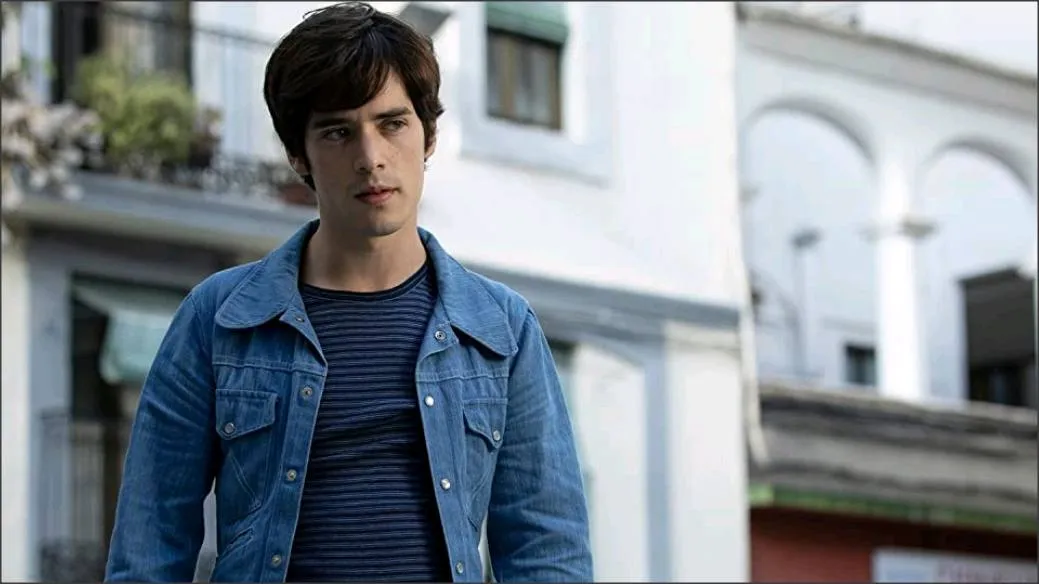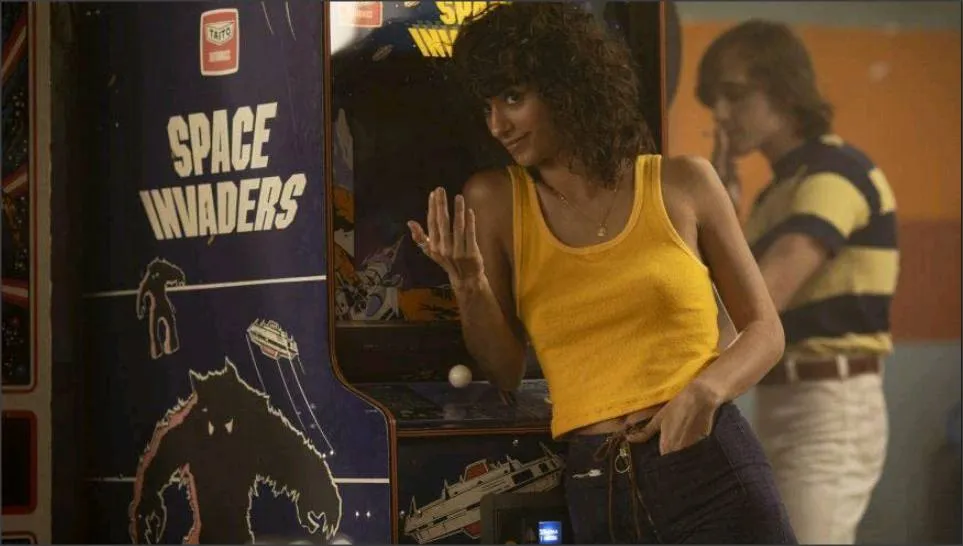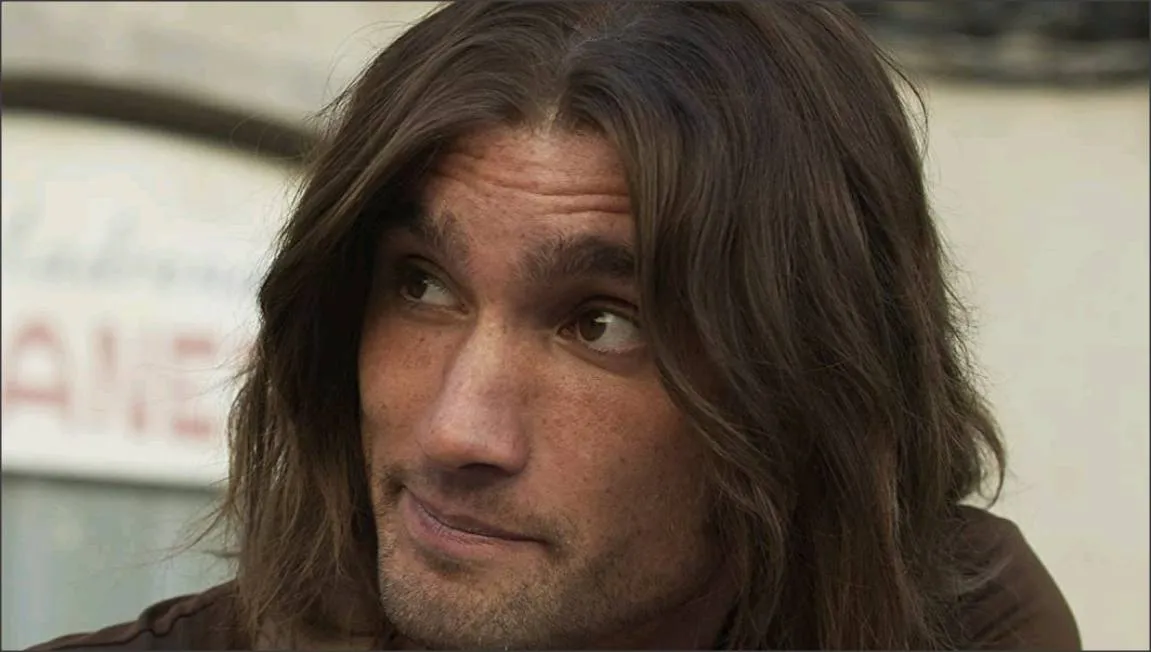I hadn't seen a Spanish film for several months and two nights ago I had time to see Las Leyes de la Frontera, a film that I can only say is beautiful. It is beautiful in every aspect, both for the romanticism that the director gives to the recreation of an era of Spanish society and cinema, without delving too much into the social theme. Here he plays with nostalgia, elements of quinqui cinema and a cinematic love story that breaks hearts and makes you cry, thanks to the chemistry of some very well directed young actors, making their emotions go beyond the screen.
Llevaba varios meses sin ver una película española y hace dos noches tuve tiempo de ver Las Leyes de la Frontera, una película que sólo puedo decir que es preciosa. Es hermosa en todos los aspectos, tanto por el romanticismo que el director le da a la recreación de una época de la sociedad y el cine español, sin ahondar demasiado en el tema social. Aquí juega con la nostalgia, elementos del cine quinqui y una historia de amor cinematográfica que rompe corazones y hace llorar, gracias a la química de unos actores jóvenes muy bien dirigidos, haciendo que sus emociones traspasen la pantalla.


English
I believe that Spaniards who lived through that era, the seventies and early eighties, are the ones who will enjoy the film the most, making them travel back to their youth, surely some of them met characters like those in the film, heard about the robberies or saw those dangerous streets, where young delinquents consumed drugs and planned robberies. The nostalgia factor will influence a large number of Spanish viewers.
Those of us who are not Spanish should not worry, even if we are foreign to some dialect of the area where the plot develops and have cultural differences, the love story in the midst of a group of young delinquents, uses cinematic language to enchant all viewers.
Daniel Monzón is a renowned Spanish filmmaker with great talent, I remember when I saw El corazón del guerrero, I knew he would be a director to keep in mind in the future. That was about 20 years ago, which he proved when he achieved great critical and audience success with the film Cell 211, starring Luis Tosar, who played a character called Malamadre. Dear reader, if you haven't seen Cell 211, I recommend you to look it up and watch it. You will not regret it, it is a brutal prison movie, adapted from a novel by writer Francisco Perez Gandul.
Quinqui Style
In a review I did in April of this year, about the Spanish film Hasta el Cielo, I briefly explained about this Spanish film subgenre, which was very popular in the times of the democratic transition in that country. You can read the review of that movie here, where there is a link to an article on the internet where quinqui cinema is explained in more detail. You can also do your homework, and when you finish reading my post, do some research on the internet about this type of cinema and its relevance in the history of Spanish cinema.
The book
Las Leyes de la Frontera is also an adaptation of a book, this time by the famous writer Javier Cercas, winner of multiple awards and whose novels have already been adapted to the big screen. I really liked the movie and have looked for the book in digital format, I hope to start reading it in the next few weeks, I'm looking forward to compare the literary material with the adaptation written by Daniel Monzón and Jorge Guerricaechevarría, who have worked together since they wrote the screenplay of The Kovak Box. If you are one of those who like to read, I also recommend you to look for the book that was published in 2012. In addition, you may be interested in other novels by the author. Look for information about all his books on the internet.
Español
Creo que los españoles que vivieron esa época, los años setenta y principios de los ochenta, son los que más disfrutarán de la película, haciéndoles viajar a su juventud, seguramente algunos de ellos conocieron a personajes como los de la película, escucharon sobre los robos o vieron esas calles peligrosas, donde los jóvenes delincuentes consumían drogas y planeaban robos. El factor nostalgia influirá en un gran número de espectadores españoles.
Los que no somos españoles no debemos preocuparnos, aunque seamos ajenos a algún dialecto de la zona donde se desarrolla la trama y tengamos diferencias culturales, la historia de amor en medio de un grupo de jóvenes delincuentes, utiliza el lenguaje cinematográfico para encantar a todos los espectadores.
Daniel Monzón es un reconocido cineasta español con gran talento, recuerdo que cuando vi El corazón del guerrero, supe que sería un director a tener en cuenta en el futuro. De eso hace ya unos 20 años, lo que demostró cuando consiguió un gran éxito de crítica y de espectadores, con el film Celda 211, protagonizada por Luis Tosar, que interpretaba a un personaje llamado Malamadre. Querido lector, si no has visto Celda 211, te recomiendo que la busques y la veas. No se arrepentirá, es una película carcelaria brutal, adaptada de una novela del escritor Francisco Pérez Gandul.
Estilo Quinqui
En una crítica que hice en abril de este año, sobre la película española Hasta el Cielo, expliqué brevemente sobre este subgénero cinematográfico español, que fue muy popular en los tiempos de la transición democrática de ese país. Puedes leer la crítica de esa película aquí, donde hay un enlace a un artículo en internet donde se explica con más detalle el cine quinqui. También puedes hacer los deberes, y cuando termines de leer mi post, hacer una investigación en internet sobre este tipo de cine y su relevancia en la historia del cine español.
El libro
Las Leyes de la Frontera también es una adaptación de un libro, esta vez del famoso escritor Javier Cercas, ganador de múltiples premios y cuyas novelas ya han sido adaptadas a la gran pantalla. Me gustó mucho la película y he buscado el libro en formato digital, espero empezar a leerlo en las próximas semanas, tengo muchas ganas de comparar el material literario con la adaptación escrita por Daniel Monzón y Jorge Guerricaechevarría, que han trabajado juntos desde que escribieron el guión de La caja de Kovak. Si eres de los que les gusta leer, también te recomiendo que busques el libro que se publicó en 2012. Además, te pueden interesar otras novelas del autor. Busca información sobre todos sus libros en internet.

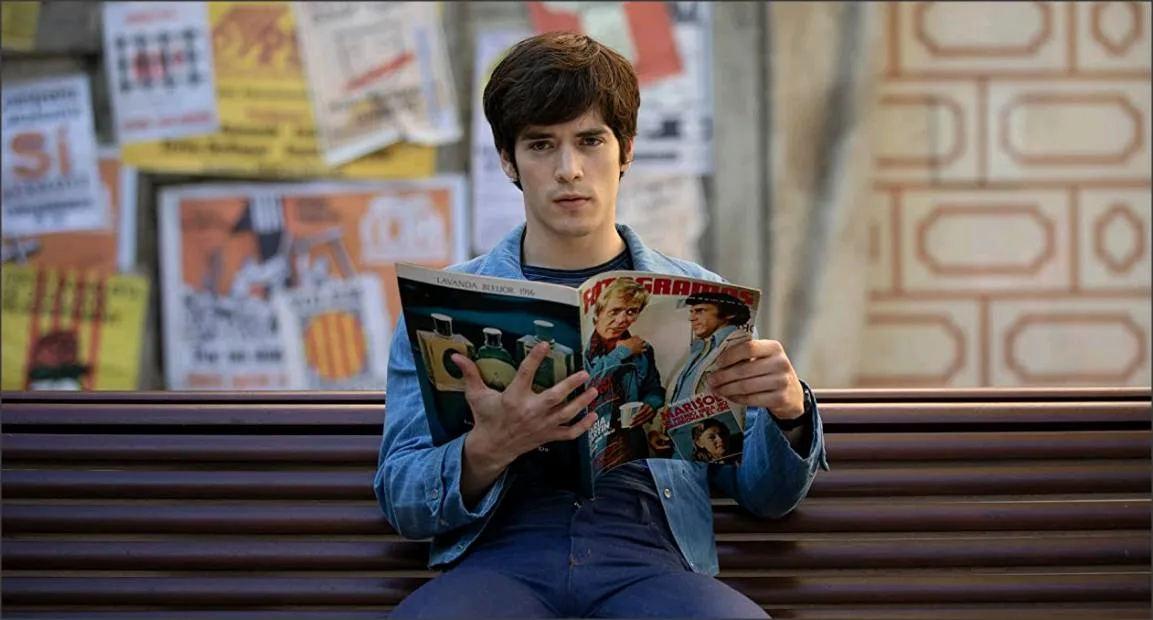

What is the plot?
Young Ignacio ("Nacho") Cañas is a half-witted teenager, the typical boy who looks like a nerd with his glasses, and who is also a victim of bullying by his classmates, who do not miss any opportunity to make fun of him and tease him. At the age of 17, he has lived through the time when Spain was entering democracy, leaving behind the period of repression and conservatism imposed by Franco. He spends his time in a recreation center in Gerona, his life takes a sharp turn when he meets the attractive Tere, a half gypsy girl, and Zarco, who seem to be united. Nacho will be nicknamed Gafitas and is invited to go to Chinatown, where Zarco and Tere meet other members of a small gang of young men who are involved in robbery. Gafitas will not be able to resist, for the first time he feels that feeling called love. The shy young man soon crosses the border that separates him from the criminal world, participating in the robberies, risking his life, consuming drugs, alcohol and the sexual awakening of a boy his age. Nacho is fed up with his pathetic personal and family life, while the atmosphere of fraternity with the delinquent boys grows and the police get closer and closer. What will happen to Gafitas? Will he become a delinquent? Will he escape the dark destiny of the gang? Will he manage to fall in love with Tere? Does this relationship have a future? What role does Zarco play in all this? Will he be arrested by the police? Will he forge his own destiny?
¿Cuál es la trama?
El joven Ignacio ("Nacho") Cañas es un adolescente medio tonto, el típico chico que parece un empollón con sus gafas, y que además es víctima del acoso escolar por parte de sus compañeros de clase, que no desaprovechan ninguna oportunidad para burlarse de él y tomarle el pelo. Con 17 años, ha vivido la época en la que España entraba en la democracia, dejando atrás el periodo de represión y conservadurismo impuesto por Franco. Pasa el tiempo en un centro recreativo de Gerona, su vida da un giro brusco cuando conoce a la atractiva Tere, una chica medio gitana, y a Zarco, que parecen estar unidos. Nacho será apodado Gafitas y es invitado a ir al Barrio Chino, donde Zarco y Tere se reúnen con otros miembros de una pequeña banda de jóvenes que se dedican a robar. Gafitas no podrá resistirse, por primera vez siente ese sentimiento llamado amor. El tímido joven pronto cruza la frontera que le separa del mundo delictivo, participando en los robos, arriesgando su vida, consumiendo drogas, alcohol y el despertar sexual de un chico de su edad. Nacho está harto de su patética vida personal y familiar, mientras el ambiente de fraternidad con los chicos delincuentes crece y la policía se acerca cada vez más. ¿Qué pasará con Gafitas? ¿Se convertirá en un delincuente? ¿Escapará del oscuro destino de la banda? ¿Conseguirá enamorarse de Tere? ¿Tiene futuro esta relación? ¿Qué papel juega el Zarco en todo esto? ¿Será detenido por la policía? ¿Forjara su propio destino?

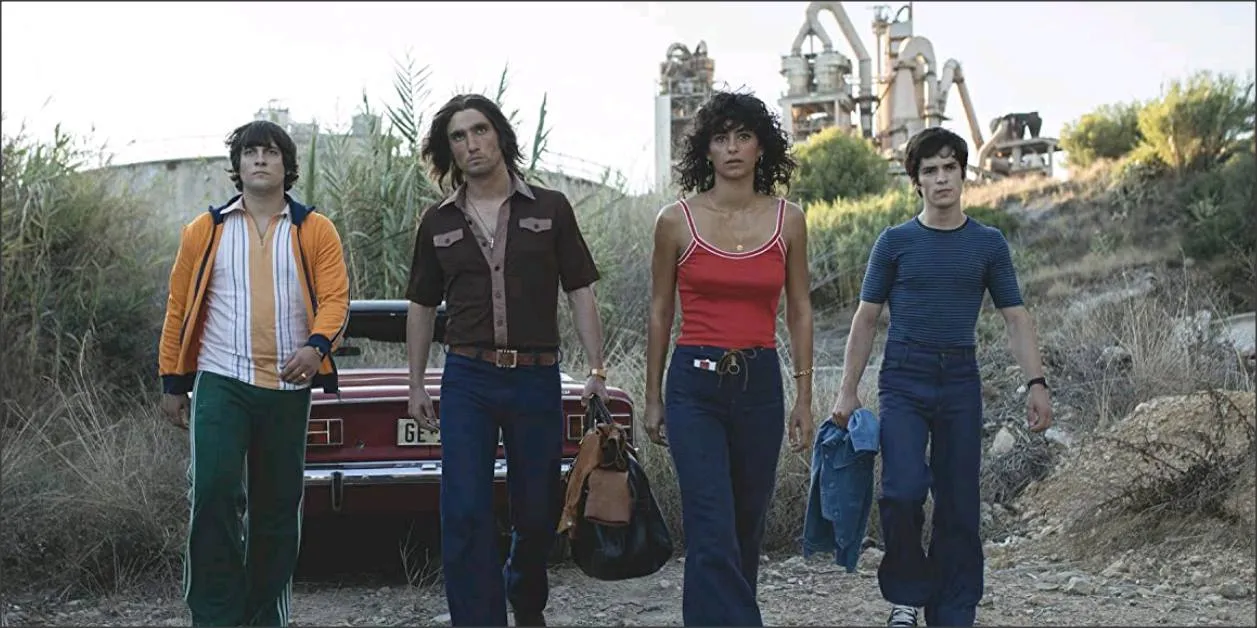

OPINION
At the end of the movie, I couldn't help crying. I had seen a movie made with love, something that is noticeable and that transmitted to me. Not only because of the beautiful love story between Nacho el Gafitas and Tere, a love marked by self-imposed barriers, which will have an explanation at the end of the film.
It is a film that evokes the love of times gone by, even embellishing a bit the whole style of quinqui cinema. This may provoke some situations a little hard to believe, but as I said at the beginning, I am not Spanish and much less I lived that era. Only someone who was young in that decade can tell us how much is true or false in the movie. I stick only to the cinematographic aspect and how it made me feel.
I found the film to be a wonderful adventure of initiation and awakening of youth. There are many similar stories, the filmmaker does not present a story that entails something new, but he does give that romantic touch to both the gang of delinquents, who as soon as they make a hit, run to spend it all on drugs, alcohol and prostitutes.
Nacho is at the same time a representation of that new Spain, the one that entered the democratic era, after the whole dark period of Franco's dictatorship. The country was opening a new path, totally unknown, just like Nacho, who gets involved in something new, something that excites him and takes him out of a boring and strict life under his parents' roof.
It must have been difficult for many young people of that time, growing up under a conservative dictatorship, where the tyrant believed he had the right to decide what everyone did, even in his own home. All of us who have lived under a dictatorship know what that means. That is why the quinqui genre was very popular among the youth of the seventies, although it had many detractors, the kids from the poorest neighborhoods felt identified with the delinquents they saw in those movies.
Las Leyes de la frontera presents an affectionate look, full of nostalgia and very well set, so that Spanish viewers, now in their fifties, remember in a beautiful way a part of their past.
Opínion
Al final de la película aguante las ganas de llorar. Había visto una película hecha con amor, algo que se nota y que me transmitió. No sólo por la bonita historia de amor entre Nacho el Gafitas y Tere, un amor marcado por las barreras autoimpuestas, que tendrá una explicación al final de la película.
Es una película que evoca el amor de tiempos pasados, incluso adorna un poco todo el estilo del cine quinqui. Esto puede provocar algunas situaciones un poco difíciles de creer, pero como dije al principio, no soy español y mucho menos viví esa época. Solo alguien que fue joven en esa década puede decirnos cuanto hay de verdad o de mentira en la película. Yo me ciño sólo al aspecto cinematográfico y a lo que me hizo sentir.
La película me pareció una maravillosa aventura de iniciación y despertar de la juventud. Hay muchas historias similares, el cineasta no presenta una historia que conlleve algo nuevo, pero sí da ese toque romántico tanto a la banda de delincuentes, que en cuanto dan un golpe, corren a gastarlo todo en drogas, alcohol y prostitutas.
Nacho es al mismo tiempo una representación de esa nueva España, la que entró en la era democrática, después de todo el oscuro periodo de la dictadura franquista. El país abría un nuevo camino, totalmente desconocido, al igual que Nacho, que se involucra en algo nuevo, algo que le ilusiona y le saca de una vida aburrida y estricta bajo el techo de sus padres.
Debió ser difícil para muchos jóvenes de aquella época, crecer bajo una dictadura conservadora, donde el tirano se creía con derecho a decidir lo que cada uno hacía, incluso en su propia casa. Todos los que hemos vivido bajo una dictadura sabemos lo que eso significa. Por eso el género quinqui fue muy popular entre la juventud de los setenta, aunque tenía muchos detractores, los chicos de los barrios más pobres se sentían identificados con los delincuentes que veían en esas películas.
Las Leyes de la frontera presenta una mirada cariñosa, llena de nostalgia y muy bien ambientada, para que los espectadores españoles, ahora cincuentones, recuerden de una manera hermosa una parte de su pasado.

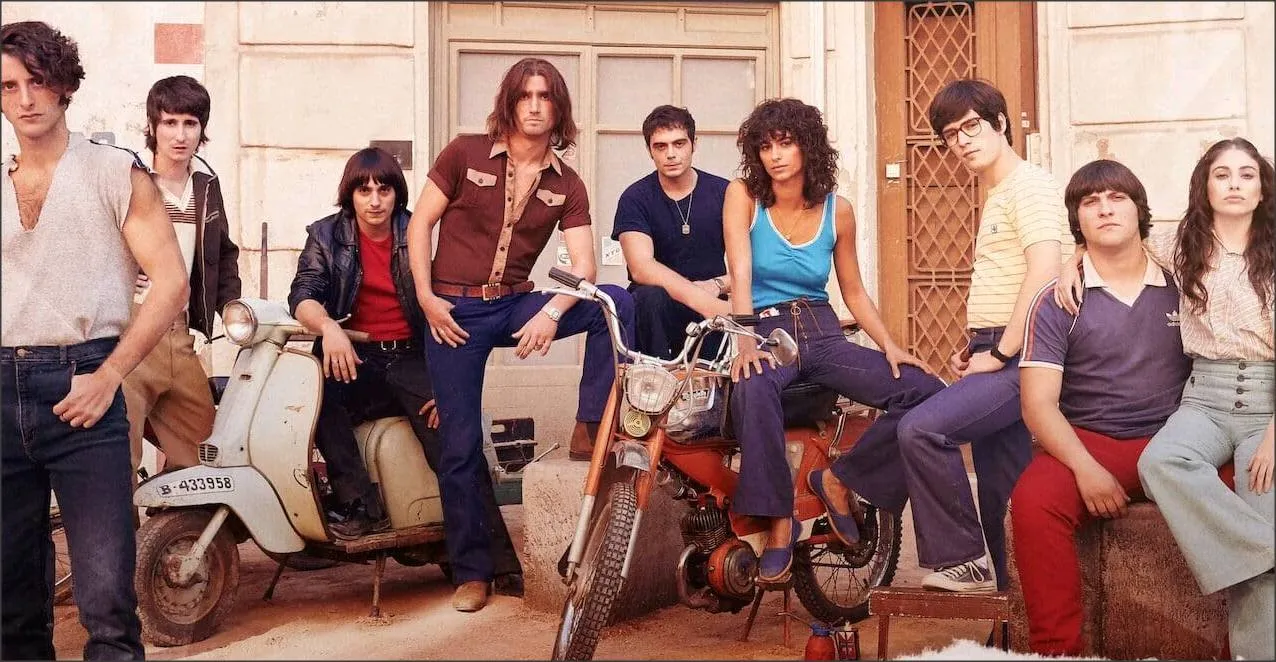

The film has action, shootouts, chases and deaths, but nothing in a crude way. The director wants us to enjoy the film, with those ingredients, but dosing the violence, because it is not about showing the darkest and most realistic side. Of course the criminals commit their misdeeds, but the focus is more on Nacho's relationship with the gang and, above all, with Zarco and Tere. A trio of protagonists with a love story that will remain forever in our minds.
Did you fall in love when you were young, did you think you had fallen in love, do you remember that first love? The love story between Gafitas and Tere is what I liked most about the film, I have always said that you can't really love without that feeling being accompanied by a bit of suffering. Two beings so different, both in social classes, as in the way of seeing life. A love that seems to be condemned to not work. The character of Zarco, always around both of them. Zarco is Nacho's friend, but at the same time he seems to be his opponent for Tere's love. But is this really so? A final revelation will make sense of it all, imbuing the story with a greater sadness.
It is a story that engages from the beginning, it is a film in which a bond is created with the viewer, when evaluating a film, I take into account many elements, and where there may be small flaws, these can be compensated with other variants. The laws of the border already has a solid foundation, the novel and the screenwriters have made a great adaptation, plus an excellent job of setting and photography, recreating the seventies, along with an elaborate costumes that takes us to those times with credible young actors.
La película tiene acción, tiroteos, persecuciones y muertes, pero nada de forma burda. El director quiere que disfrutemos de la película, con esos ingredientes, pero dosificando la violencia, porque no se trata de mostrar el lado más oscuro y realista. Por supuesto que los delincuentes cometen sus fechorías, pero se centra más en la relación de Nacho con la banda y, sobre todo, con Zarco y Tere. Un trío de protagonistas con una historia de amor que quedará para siempre en nuestras mentes.
¿Te enamoraste de joven, creíste que te habías enamorado, recuerdas ese primer amor? La historia de amor entre Gafitas y Tere es lo que más me ha gustado de la película, siempre he dicho que no se puede amar de verdad sin que ese sentimiento vaya acompañado de un poco de sufrimiento. Dos seres tan diferentes, tanto en clases sociales, como en la forma de ver la vida. Un amor que parece estar condenado a no funcionar. El personaje de Zarco, siempre alrededor de ambos. Zarco es el amigo de Nacho, pero al mismo tiempo parece ser su contrincante por el amor de Tere. Pero, ¿es realmente así? Una revelación final dará sentido a todo ello, impregnando la historia de una mayor tristeza.
Es una historia que engancha desde el principio, es una película en la que se crea un vínculo con el espectador, a la hora de valorar una película, tengo en cuenta muchos elementos, y donde puede haber pequeños fallos, estos se pueden compensar con otras variantes. Las leyes de la frontera ya tiene una base sólida, la novela y los guionistas han hecho una gran adaptación, además de un excelente trabajo de ambientación y fotografía, recreando los años setenta, junto con un elaborado vestuario que nos traslada a esas épocas con actores jóvenes creíbles.

The actors. I think a great weight of this beautiful film falls on them. Three actors who are fantastic in their characters. I have no doubt that they are the ones who made me enjoy two hours of film. There is chemistry here, I don't know if in real life they would get along well, but in the film, they did a great job, one of them I think has received a Goya nomination for best new actor. They are very well composed, believable and most importantly, with a gesture they are able to convey emotions.
Los actores. Creo que un gran peso de esta hermosa película recae sobre ellos. Tres actores que están fantásticos en sus personajes. No tengo ninguna duda de que son ellos los que me hicieron disfrutar de dos horas de película. Aquí hay química, no sé si en la vida real se llevarían bien, pero en la película, hicieron un gran trabajo, uno de ellos creo que ha recibido una nominación al Goya como mejor actor revelación. Están muy bien compuestos, son creíbles y lo más importante, con un gesto son capaces de transmitir emociones.

Nacho, the shy 17 year old with a gray life, is the one who crosses the border from being a good kid to being part of a criminal group. He is wonderfully played by the young actor Marco Ruiz, who has participated in other Spanish productions, such as Zipi y Zape, El Hombre de las mil Caras and some TV work. I liked his interpretation of Gafitas, perfectly conveying the transformation his character undergoes.
Nacho, el tímido joven de 17 años con una vida gris, es el que cruza la frontera de ser un buen chico a formar parte de un grupo criminal. Está maravillosamente interpretado por el joven actor Marco Ruiz, que ha participado en otras producciones españolas, como Zipi y Zape, El Hombre de las mil Caras y algún trabajo en televisión. Me ha gustado su interpretación de Gafitas, transmitiendo perfectamente la transformación que sufre su personaje.

Tere. The half gypsy girl who is part of the gang, it is clear to her that she was born to be part of that world. She seems to be attracted to Gafitas, only to use him, or does she really feel something? She herself seems to impose a barrier between them. What is the reason? This character is fantastic and I fell in love with her, as well as Gafitas who seems a fool in love with her. You have to pay attention to the actress Begoña Vargas, I think this film will mark a before and after in her career. To the actress it is enough with a look or a gesture to convey the message on the screen. I have not seen if she has been nominated for any award, I will look on the internet later, but if not, an injustice has been done.
Tere. La chica medio gitana que forma parte de la banda, tiene claro que ha nacido para formar parte de ese mundo. Parece sentirse atraída por el Gafitas, sólo para utilizarlo, ¿o realmente siente algo? Ella misma parece imponer una barrera entre ellos. ¿Cuál es la razón? Este personaje es fantástico y me enamoré de ella, al igual que Gafitas que parece un tonto enamorado de ella. Hay que prestar atención a la actriz Begoña Vargas, creo que esta película marcará un antes y un después en su carrera. A la actriz le basta con una mirada o un gesto para transmitir el mensaje en la pantalla. No he visto si ha sido nominada a algún premio, luego buscaré en internet, pero si no es así, se ha cometido una injusticia.

Zarco, the one who serves as the leader of the group of criminals, is the one who plans the robberies and seems to have a relationship with Tere, as they are always together and are very affectionate with each other. He is a character with a lot of magnetism, a presence that is noticeable both by his physique and his voice. A delinquent who knows that his destiny will be jail or death and does not want Nacho to have that life. The actor who plays him is called Chechu Salgado and has received a Goya nomination for this work. He is a great actor, I had seen him in two miniseries: Fariña and Patria. But his work in this film consolidates him as an actor and it will surely be very frequent to see him in future productions.
Zarco, el que ejerce de líder del grupo de delincuentes, es quien planea los robos y parece tener una relación con Tere, ya que siempre están juntos y son muy cariñosos el uno con el otro. Es un personaje con mucho magnetismo, una presencia que se nota tanto por su físico como por su voz. Un delincuente que sabe que su destino será la cárcel o la muerte y no quiere que Nacho tenga esa vida. El actor que lo interpreta se llama Chechu Salgado y ha recibido una nominación al Goya por este trabajo. Es un gran actor, lo había visto en dos miniseries: Fariña y Patria. Pero su trabajo en esta película le consolida como actor y seguramente será muy frecuente verle en futuras producciones.

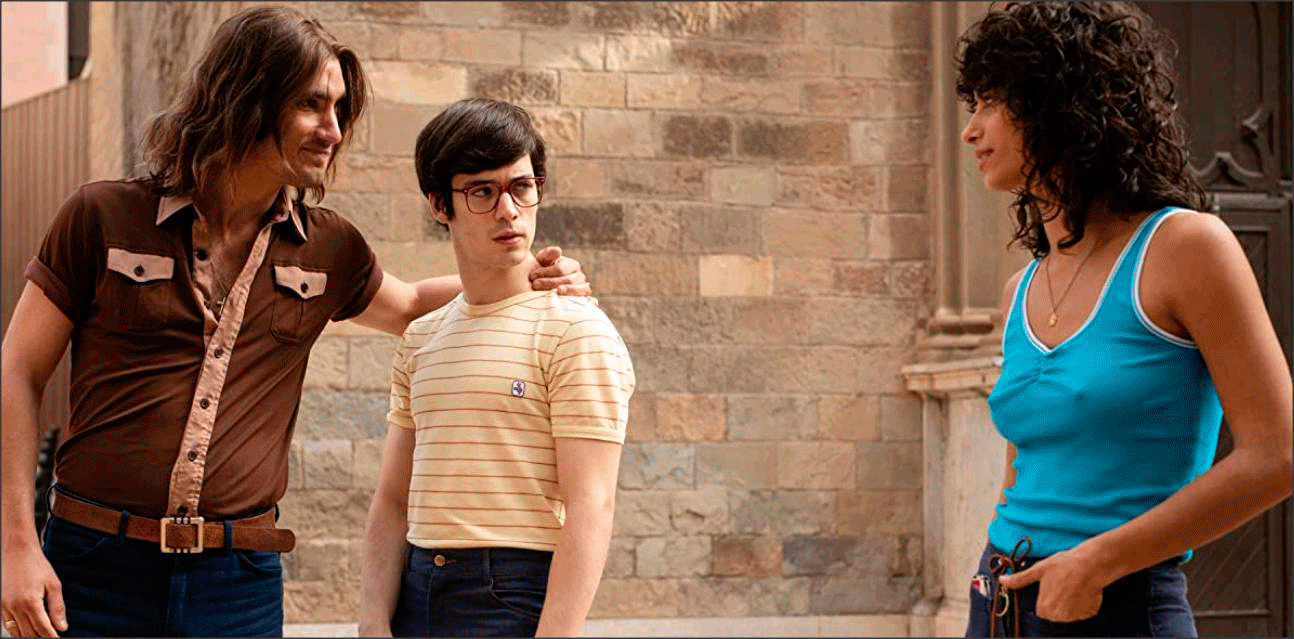

The Laws of the Border, what else can I say? It is a beautifully made story of initiation and adolescence with reminiscences to quinqui cinema. With a starring trio that eats up the screen. The three are great and are the backbone of the story. After a long time without seeing Spanish cinema, it has been very nice to have seen this film. That's why I want to recommend it and I hope that someone will appreciate all the good things in this story. I like Spanish cinema, it is another factor that influences my perception. I hope you are encouraged to see it, it is worth seeing.
When you see it, don't forget to tell me your opinion about the movie in the comments.
Las Leyes de la Frontera, ¿qué más puedo decir? Es una historia de iniciación y adolescencia bellamente realizada con reminiscencias al cine quinqui. Con un trío protagonista que se come la pantalla. Los tres están geniales y son el eje central de la historia. Después de pasar mucho tiempo sin ver cine español, ha sido muy agradable haber visto esta película. Por eso la quiero recomendar y espero que alguno sepa apreciar todo lo bueno de esta historia. Me gusta el cine español, es otro factor que influye en mi percepción. Espero que se animen a verla, vale la pena.
Cuando la veas no olvides contarme tu opinión sobre la película en los comentarios.

My Ranking:
3.8/5

Trailer

POSTER
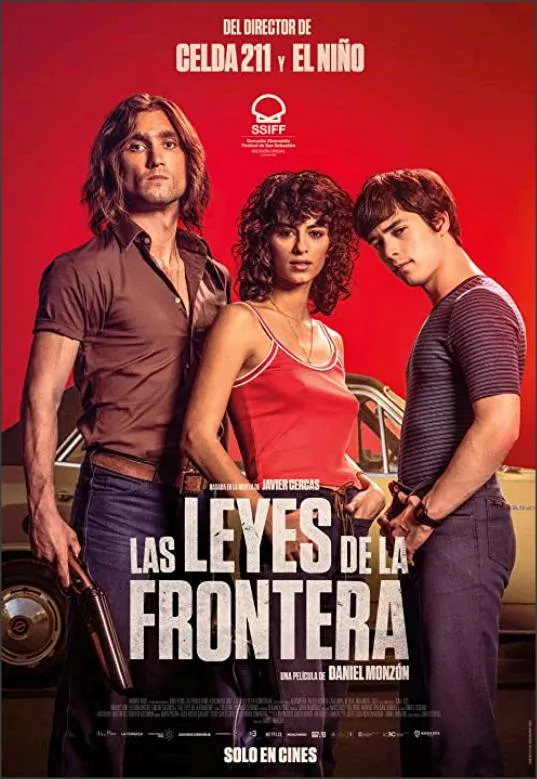

Gifs and separators made by me in photoshop

Other recent film reviews
 Last Night in Soho / FILM REVIEW Last Night in Soho / FILM REVIEW | 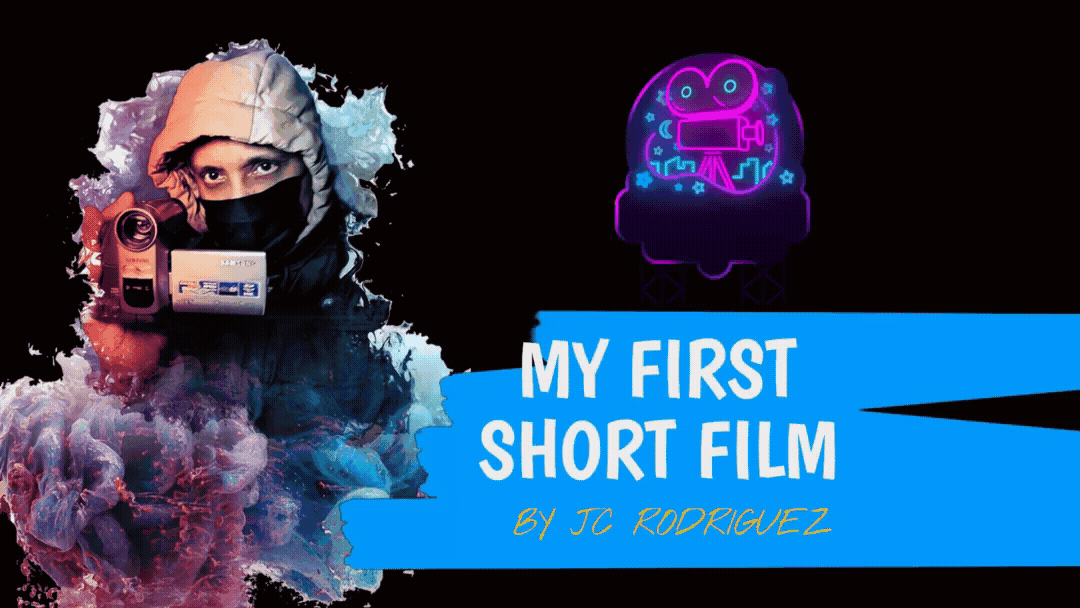 My first short film My first short film |  The Last Duel / FILM REVIEW The Last Duel / FILM REVIEW |

Movies & TV Shows Community




